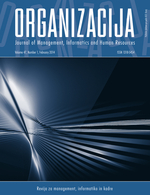Impacts of the Transformation to Industry 4.0 in the Manufacturing Sector: The Case of the U.S.
Abstract
Background and purpose: The transformation to Industry 4.0 increases the number of robots installed within industries, which brings great shifts in industrial ecosystems. For this reason, our research goal was to analyze the key performance indicators to investigate the economic and social sustainability of the changes in production.
Methodology: The combination of official (World Bank, U.S. Bureau of Labor Statistics) and publicly available (Federal Reserve Economic Data, Industrial Federation of Robotics) data was used for statistical data processing, including comparison, correlation, cross-correlation and vector autoregression analysis, to present the past developments and also to predict future trends within the U.S. manufacturing sector.
Results: In contrast to robust industry robotization observed in the 2008–2018 period, the share of manufacturing output and employment declined. Nonetheless, the vector autoregression model forecast shows, that the U.S. manufacturing sector has arrived at a turning point, after which robotization can increase employment and labor productivity of workers, while also stimulating further growth of their education levels.
Conclusion: The transition to Industry 4.0 has a major impact on increasing demands for new knowledge and skills for increased productivity. Accordingly, forecasted growths of analyzed manufacturing indicators suggest that negative impacts of robotization in the recent past were only temporary, due to the entrance to the Industry 4.0 era. Nonetheless, additional policies to support sustainable industry development are required.
Keywords: Industry transformation, Robotization, Industrial output, Labor productivity, Employment, Education level, Industry 4.0, Industry 5.0
Methodology: The combination of official (World Bank, U.S. Bureau of Labor Statistics) and publicly available (Federal Reserve Economic Data, Industrial Federation of Robotics) data was used for statistical data processing, including comparison, correlation, cross-correlation and vector autoregression analysis, to present the past developments and also to predict future trends within the U.S. manufacturing sector.
Results: In contrast to robust industry robotization observed in the 2008–2018 period, the share of manufacturing output and employment declined. Nonetheless, the vector autoregression model forecast shows, that the U.S. manufacturing sector has arrived at a turning point, after which robotization can increase employment and labor productivity of workers, while also stimulating further growth of their education levels.
Conclusion: The transition to Industry 4.0 has a major impact on increasing demands for new knowledge and skills for increased productivity. Accordingly, forecasted growths of analyzed manufacturing indicators suggest that negative impacts of robotization in the recent past were only temporary, due to the entrance to the Industry 4.0 era. Nonetheless, additional policies to support sustainable industry development are required.
Keywords: Industry transformation, Robotization, Industrial output, Labor productivity, Employment, Education level, Industry 4.0, Industry 5.0
Refbacks
- There are currently no refbacks.

